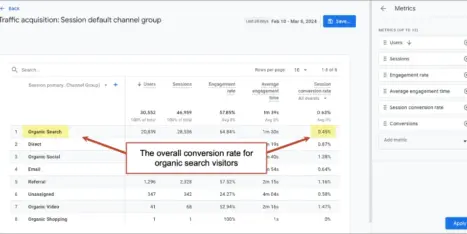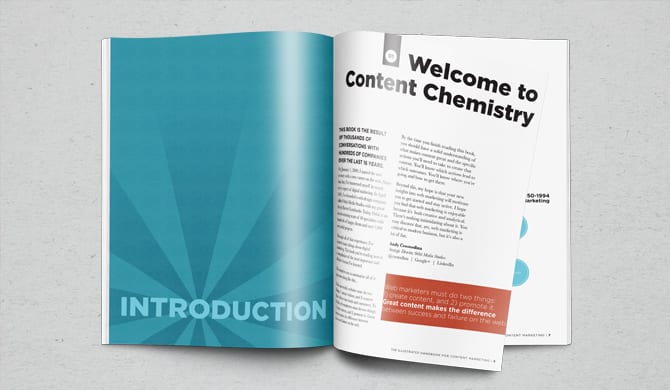Beginnings are beautiful. But they’re also scary, confusing and frustrating. There are hundreds of possible first steps in starting a blog and your content marketing efforts. So many decisions to make.
How do I start a blog? Am I doing this right?
These are some of the most common questions. So we’ve put all of our best advice about starting a blog into one article. This is a mini-course in blogging 101 and content marketing. It will introduce all the main tactics, provide links that go deeper and show you how to get started on content marketing.
A few years from today, your content will be a solid source of awareness and traffic. It will have high rankings, vibrant social followings and a loyal subscriber list. It will be a durable fortress that you will build and defend.
Like a castle, you’ll build it brick by brick. Like a castle, you’ll build it on solid ground. Like a castle, it will have an army of allies.
Special Note: Beginners have an advantage over bigger brands. There are ways to do marketing that big companies can’t touch. To see those specific tips, skip down to “building alliances” and read Where to start with digital marketing? Here are the top 10 things to do first.
Set the foundation
Here’s how to set yourself up for future success. These aren’t actions you’ll repeat. Do them once, correctly and they’re done.
1. Document your mission
The foundation of your blog is your content marketing mission. Simply writing down your content’s mission statement will make you statistically more likely to succeed at content marketing.

The process will force you to choose a niche. To niche down into a specific audience. That’s the key to your long term success. The narrower the niche, the faster you’ll get results.
This short animation will give you an overview of the big picture of content strategy:
Don’t think about blog topics and content formats until you’ve decided who you’re writing for and why they care.
2. Set your domain once and for all time
Your web address is the ground on which you build. Don’t build on rented land. Never host your blog on someone else’s domain (mysiteblog.medium.com). Your blog must be at the same location as the rest of your website (mysite.com/blog).
Changing your address is not ideal for your brand or your search rankings.
3. Start and stay organized. Create systems for capturing ideas and producing content.
You need tools to stay organized and efficient. A lot of veteran marketers regret not setting up organization systems sooner. Just pick simple, inexpensive ways to capture and create content.
- A tool for capturing new ideas, from anywhere easily.
- A place to keep partially written posts, after you take them out of the idea phase.
- A list of finished posts and guest posts. This is your LBOW (lifetime body of work).
At Orbit, we use Google Suite for everything, including our content marketing template. But we know people who use Evernote, Office 365, WordPress and paper.
4. Create thank you pages ….and goals in GA4
You’re blogging for a reason. Hopefully, your long term plan is to make money somehow, by generating leads for a business, selling a product or becoming an affiliate.
Before you start publishing, your website should be ready to capture and track website conversions. This means having a contact form and a thank you page. Not an email link. That thank you page will let you track goals in Analytics and measure success.
This is called a conversion event goal. There will be very few at first, but you need to learn to track them accurately.
Note: Joe Pulizzi’s book, Content Inc, suggests building an audience long before you know how to monetize it. We love that idea. But if you already have a product or service, make sure your site measures conversions accurately so you can measure the impact of your content.
5. Optimize your blog for email sign ups
From day one, the site should be built to grow your list. This is the key to getting maximum value from that early trickle of traffic. Your email signup form should include the three P’s:
- Prominence
It should visually stand out. It doesn’t have to be a popup window, but it should, at least, use strong color contrast and be available very close to your content. - Promise
It should tell people what they’ll get and how often they’ll get it. You’re trying to make an appointment with your audience. Commit to a frequency and tell them what it is. - Proof
It should include a third party endorsement. You have very few subscribers in the beginning, so you can’t brag about the size of your list. Instead, use a testimonial quote from someone who loves getting your advice.
Here’s a signup box that has all three P’s:
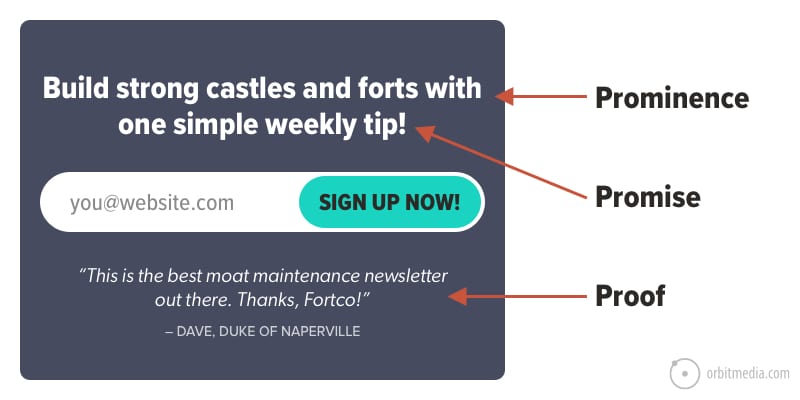
A growing email list means less reliance on Google, Facebook and Twitter. You don’t own your rankings or your social followings. But you do own your email list. Email is key to building a durable competitive advantage.
6. Polish your LinkedIn profile until it shines
When you’re team is small, each personal brand is critical. So in the very beginning, your LinkedIn profiles are almost as important as your website.
You’re about to start doing a lot of outreach. People are going to search for you. Google your name now. What do you see? Is LinkedIn there? Click on it. What do you see?
Anyone who sees your profile should give you an A grade in each of these categories:
- Headshot
- Title
- Description
- Recommendations and endorsements
 |
“Don’t be a LinkedIn slacker. That is, don’t settle for merely signing up and checking in occasionally. Rock your profile in creative and compelling ways. Publish and share content often. And above all, make new connections and nurture the ones you’ve already established. LinkedIn is a network, so build your brand by networking.” – Barry Feldman, Blogger, Podcaster, Author of The Road to Recognition |
7. Forget about technology
Don’t waste time agonizing over tools and platforms. Start a blog on WordPress or Medium? MailChimp or Constant Contact? Who cares! It’s not a factor in results. Results come from activity, not tools. This is all you need:
- A way to publish blog articles (WordPress or similar)
- A way to send email (any email service provider will do)
- A way to measure traffic (GA4 is fine)
Please do NOT spend money on marketing automation in the beginning. You do not need marketing automation to get started in content marketing. It’s probably a huge waste of money. Beginners who buy Hubspot often spend $1000 per month and only use it to send email.
Why try to automate something you’ve never done manually? Someday we’ll share our list of criteria that you should meet before budgeting for marketing automation. If you want a preview, ask me in the comments.
Tech Tip: Try to use a URL structure that is search friendly and not likely to change. That means short, few slashes, keyphrase relevant and no numbers. So it’s best if the address of a blog post looks something like this:
https://www.website.com/blog/save-money-marketing-technology/
Not this…
http://www.website.com/2017/10/5/9-tips-for-saving-money-on-marketing-technology/
A good content management system will let you set the URL for every post. Get started on the right foot with nice, clean URLs.
Make first content
Another regret that many longtime marketers have (I do) is not writing that big stuff sooner. Some of us waited too long to write our most valuable advice, missing a lot of opportunities.
8. Build a few strong pillars of content
Think of the advice you give most often. The most useful advice. Fit these into your mission and then start planning. You’re about to go deep into these topics with a few huge articles.
They call this “pillar content” or “cornerstone content” or the center of a ”content hub.” It always meets a few of these criteria:
- Deep, detailed and thorough (probably 2500 words, but concise editing)
- Extremely practical with step-by-step instructions
- Strong counter-intuitive opinion in a personal tone
Once it’s live, it’s great for social media because it’s worth sharing, worth talking about. It’s great for outreach because it’s worth sending to editors as an example of your content. It’s great for search optimization because it’s worth linking to.
 |
“Your audience wants content that is either helpful, relevant, educational or entertaining. Or all of the above. Sadly, too many companies focus their businesses and their content on themselves rather than the people who can unlock phenomenal growth and profitability – their customers. – Douglas Burdett, Host of the Marketing Book Podcast and Founder of Artillery Marketing |
9. Plan for visuals
Before you start cranking out a steady stream of 1000 word articles, let’s think about what things will look like. Is everything going to be long pages with dense blocks of text? That’s not ideal.
Plan on at least one image per article. You can use a free stock photo for the featured image at the top. Images can also break up those long blocks of text, keeping visitors engaged and flowing through the post.
Never miss a chance to add visuals that add value. It could be a diagram, infographic, video or simple illustration. It doesn’t need to be fancy. Just look at Henneke. Her colored pencils are more powerful than a video production studio.
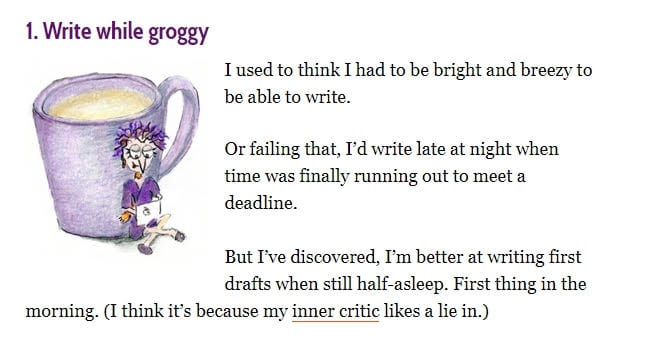
 |
“I used to think my drawings were too amateurish to publish. Shouldn’t a blog image be more slick? But I’ve found that readers connect with my hand-drawn images. They feel more human, more real than most stock photography. Simple drawings are also good for expressing emotions. So, recently I’ve started including more than one illustration in my blog posts, and it seems to increase engagement.” – Henneke Duistermaat, Business Writing Coach and Founder, Enchanting Marketing |
10. Start reaching out and guest blogging
It’s the single greatest shortcut in content marketing. Guest blogging is a fast way to reach a much larger audience. Just write for the the sites that have already built the audience you want to connect with.
In the beginning, most of your content (probably two-thirds) should be published on other websites.
It’s a ton of work. In the beginning you’ll fail more often than you succeed. But stick will it. I’ve got five benefits that you should have in mind as a beginner marketer:
- Visibility
They’ve got a way bigger audience than you. They’ve got huge social followings and a big email list. The promotion for a guest post is built-in. - Networking
Becoming friends with editors and bloggers is a big part of the fun. You’ll be connected to a community, which is important. That feeling of isolation is a big challenge in the early game. - SEO and authority
The guest post will link back to you, from the author bio and possibly from within the content. This will pass some SEO authority from their site to yours. (read: How to Increase Domain Authority) - Credibility and personal branding
The day that piece goes live, you can add “As seen in…” to your homepage and “Contributor to…” to your LinkedIn bio. Every little bit helps! - Skills and Learning
The process of pitching and working with an editor is great experience. You’ll learn outreach, collaborating and how to be a better writer. These are the critical skills.
When you pitch a guest post, the editor will be looking for evidence that you’re a pro at content. That’s why you need to publish those pillars first and make them easy for the editor to find.
Unless you’ve got something great out there already, no editor will accept you.
 |
“I built my career on a foundation of guest posting. And not once have I sent a ‘pitch.’ Each and every breakthrough has come as a result of writing a complete article tailor made for that publisher. This means paying close attention to elements like average length (word count), use of images, use of subheads (i.e., numbered posts, topical, or none) and cross linking to other posts on their site. This is particularly powerful if you’re just starting out and cold emailing. Oh, and keep your emails short. No showing off. No apologizing. Just get to the point: ‘I wrote an article for you. Here it is.” – Aaron Orendorff, Founder at iconiContent & Content Marketer at Shopify Plus |
Build your network of allies
Growth depends on relationships. The biggest challenge in the beginning is that you don’t have an army of collaborators and helpers.
But beginner marketers have an amazing opportunity.
Beginner marketers can do something the big guys can never do: roll out the red carpet for your readers. You can create a personalized, white-glove experience and build a network of super fans.
11. Email each reader personally
You know who your readers are. You know them from social media or offline conversations. Now take a moment to drop them a line. Say hello, say thank you, ask for feedback, share an idea.
There’s a marketing legend of Chris Guillebeau, best selling author and entrepreneur, that he personally reached out to his first 1000 readers. I reached out to ask him if this was true and if so, why he did it…
 |
“It was the first 10,000, not 1,000. I did it for everyone who subscribed in the first year. I wanted to understand why people were reading and how I might be able to help them. Eight years later, many of these people are still around. I see them on tour or they show up at WDS, our annual event. This was key to building my early community and I’m so glad I did it.” – Chris Guillebeau, Author and Founder of the World Domination Summit |
Wait, what?? Chris personally emailed his first 10,000 subscribers! Take a moment to ponder what a massive act of outreach and listening would do to your network, your content, your learning and you.
Here’s another great quote from Chris:
“If you only have a few readers, treat them like the most important people in the world because they are.”
12. Meet with your readers face-to-face
Sounds crazy, but it’s fun and very effective. Get together with your first fans. For anyone in town, pick a place and time and invite a few readers to come by. Order a drink or a coffee. Pick up the tab.
Trust me on this, those early meetups will be remembered. “I first met her years ago when we all met up after work. Remember that?”
These get togethers will start friendships and trigger content ideas. Talk about topics; listen for opportunities, offer to help.
13. Write a post specifically for each reader
You know who they are and what they care about. Write something just for them. This is brilliant in two ways: First, you know that at least one of readers will care. Second, the article will be in a personal tone, which is great for content marketing.
Once it’s live, send them an email with a link and a thank you.
It’s likely you’ve have already started a lot of articles in day-to-day email exchanges. Your sent mail folder may be filled with partially written posts. Just go one step farther and publish.
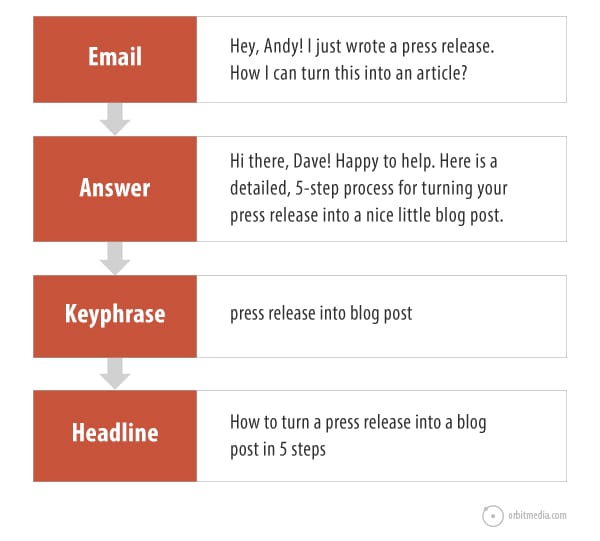
There is a special way to turn email exchanges into high ranking articles. You’ll find step-by-step instructions for that process here.
14. Add quotes from your readers in your articles
They’ll be flattered that you invited them to contribute. Just reach out with a friendly email asking them to share a few sentences on the topic. When it goes live with their face and name next to the quote, that reader will literally see themselves in your content. No big blog could ever create an experience like this.
This kind of collaborative content marketing has big social media benefits.
 |
“Make it easy on your collaborators. There should be zero hoops for them to jump through. Most of these people are extremely busy and are getting hundreds of offers. Know this going in and structure whatever you are doing to be extremely easy and hassle free. Then reward them with putting them on the forefront of whatever you put out there socially.” – Dave Reimherr, Magnificent Marketing |
15. Personally invite people to join your list
How did we get our first 1000 subscribers? Personal invitations in face-to-face conversations. It took years but it didn’t add an hour to my day.
Make it a habit to mention your blog and newsletter. Let people know that you’ve published something on this topic or that you have an article about that coming out soon. Here’s how it sounds:
Me: “Great meeting with you today. Thanks for taking the time. You know that article I mentioned? I actually write stuff like that for our newsletter every two weeks. If you’d like, I can add you to the list?”
Them: “Well, sure. Ok. You have my email address…”
Me: “I’ll add you, but please don’t hesitate to unsubscribe if you’re overwhelmed with email. I would never take it personally. The trick to email marketing is to not send email to people who won’t want it!”
Them: “Thanks for saying that, but it’s fine. Feel free to add me to your list.”
I did this hundreds of times and have always had a 95% acceptance rate. The key is to mention the blog and newsletter and then having the guts to offer to send. Remember, you have nothing to lose.
16. Send personal thank you notes
It’s called the “forgotten inbox” because people use it so rarely. But it’s easy and effective. Pick up a pen and write a thank you note to readers and friends who shared or contributed. Send a note to the editor who accepted your guest post.
If you want to stand out, do what 99% of marketers will never do. Pick up a pen! Handwritten notes are one of the 15 ways we suggest you use to say thank you to your network.
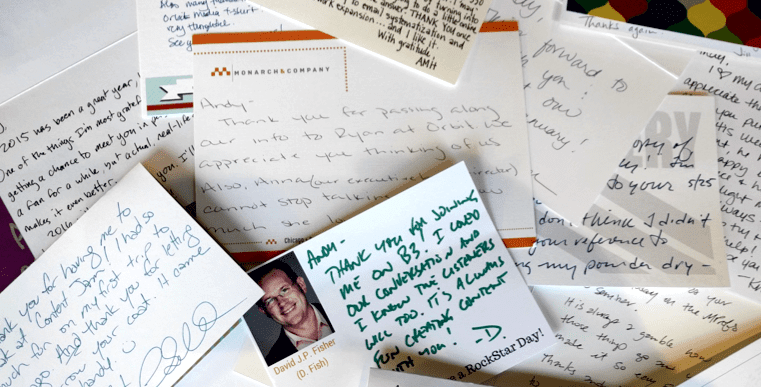
 |
“Your mother was right: thank you notes are important. Hand-written notes make an outsized impact because, unlike people’s email inbox, their mailbox doesn’t have a lot coming into it. It’s easy to stand out! The key is simplicity. Fancy notepaper is nice, but even a blank piece of printer paper works. And the note can be as simple as three sentences.
– David Fisher, Speaker, Author of Hyper-Connected Selling |
17. Answer every. Single. Comment.
In the beginning, every comment is sacred. Respond to each of them with a thoughtful message and sincere thank you.
 |
“It’s a very small thing you can do for them that means a whole lot. People come into your home because they like the way you think and the information you provide. To build community and eventual brand loyalty, It’s important to make everyone feel welcome. One way to do that is to take the time to respond to all comments. After all, they’ve made you a part of their day; make them a part of your day, too.” – Gini Dietrich, Founder of Arment Dietrich, Spinsucks |
Tip: Want more comments? End each post with a question and an invitation to add to the conversation. If you want something in life, you have to ask for it!
18. Comment on other blogs
Leaving comments is a powerful way to build relationships. It makes you visible to almost any author almost instantly. Even famous bloggers and journalists read all of their comments.
-
-
- Comment on a reader’s blog
- Comment on the blog of a someone you’d like to collaborate with
- Comment on the blog that you hope to contribute to
-
Make leaving a comment part of your daily social media routine. It’s an automatic visibility with a content creator.
 |
“Content creators hang out in the comments section of their content. Blog commenting is one of the few times you’ll get to focus their attention on you and what you’re saying.” – AJ Kohn, Author, The Ridiculous Power of Blog Comments |
19. Cross the streams with thanks and mentions
Very few marketers do this, but it’s a great way to grow your social media connections and social traffic. When someone does something on one social media network, thank them for it on another social media network.
Here’s how it works:
-
-
- You post an article on your site. Hopefully, you included a few contributor quotes and you share it, via social or email, with friends, fans and collaborators.Wait a few days…
- By this time, you should have gotten as least a few comments and a few shares on one of the social networks. Find those people either through Buzzsumo or just by watching and listening.
- Now share the article on a second social network (even if you shared there once already) and this time, say thank you to the people who shared and commented. Thank them in a way that mentions them so they are likely to see it as a notification.
- …they are more likely to share the article in that second social network. If you weren’t connected there already, this is an opportunity to follow or connect!
-
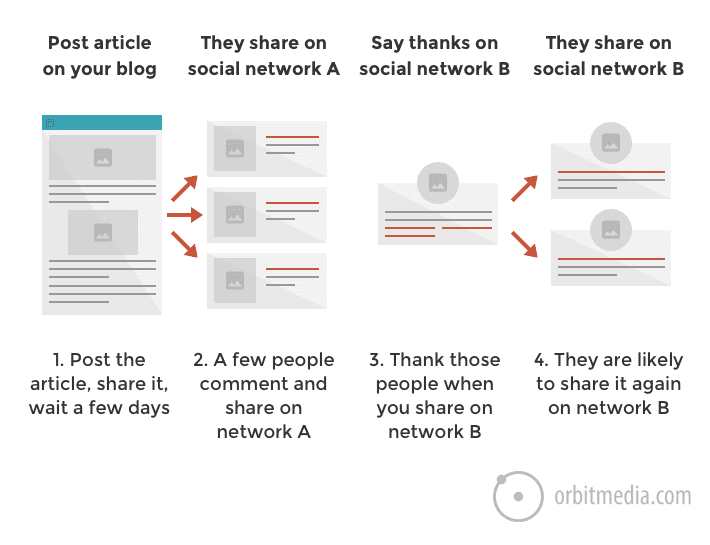
It can take up to 5-10 minutes to find, thank and mention people in this way, so most people won’t bother. But you’re creating a high-touch, personal experience for your readers.
 |
“If you’re providing compelling content, your audience will share it to their social networks. Find these people by entering your URLs into Buzzsumo and thank them everywhere. You’ll expand your network, and you may uncover future contributors for your site!” – Dennis Shiao, DNN Software |
What most people don’t tell you…
Here are a few tips to speed things up and keep you moving. You won’t find these in most marketing handbooks. These are the things they don’t teach you in class.
20. Set your activity levels very high
This one you don’t hear everyday, unless you do Crossfit or you’re training for a marathon. In the beginning, you should work very, very hard.
The effects of effective content are cumulative and durable. Every link, every follower and every subscriber give you a small but lasting benefit in search, social and email. They each make future promotion efforts slightly easier.
So extra effort in the beginning is absolutely worth it.
Get to bed early. Get up and write. Eat lunch at your desk. Stay late at the office. Work weekends. Stop scrolling through social media. Publish. Promote. Network. Learn. Repeat.
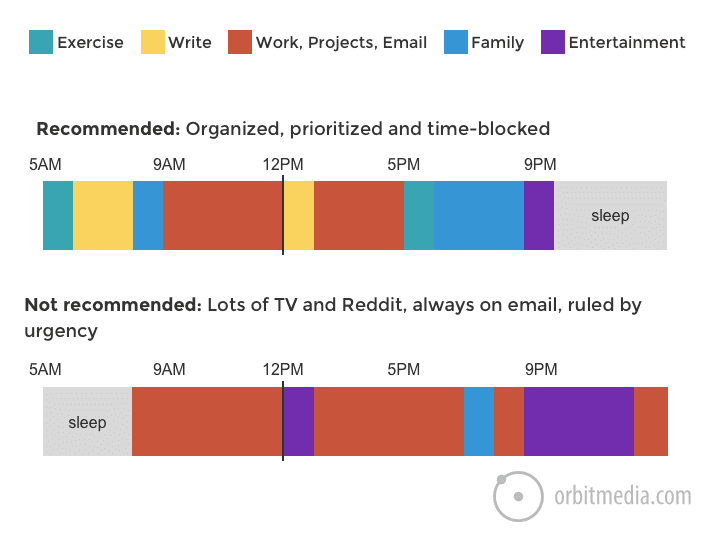
The key to time management is to prioritize, schedule important things and stop pretending you can multi-task. Take the advice from an expert, Mark Horstman…
 |
“Time management is misleading. We don’t manage time – time does just fine without us and always will. What we manage are our priorities. And by that I mean, we decide which of the many things we could do, or want to do, that we’re actually going to do. And that means putting our most important priorities (example: what days of the week will you guarantee your family that you will be home at the dinner hour?) on your calendar.” – Mark Horstman, Co-Founder, Manager Tools, The World’s #1 Business Podcast |
Let’s take Mark’s advice and put writing on our calendars. Let’s do it now…
I just did it. Did you?
Velocity matters. If you can publish and promote a high-quality article twice a week, you’ll grow twice as fast as the guy who does it weekly.
Warning: This isn’t just about publishing a lot. It’s about promotion. So spend at least as much time and energy on content promotion as writing. Good content with great promotion is far more effective than great content with good promotion.
21. Don’t compare yourself to experts
Learning by watching experts is helpful. But comparing yourself to experts is harmful. It’s discouraging to compare your results to those of famous, celebrity marketers.
In content marketing, progress is visible: followers, rankings, comments, etc. You can see how successful anyone is by using competitive analysis tools or just by glancing at the work. But it might be depressing.
Our last bit of advice is to learn from others without comparing yourself to them.
“Never compare your beginning to someone else’s middle.” – Jon Acuff, Author of Start: Punch Fear in the Face, Escape Average and Do Work that Matters
You can look, but remember, you don’t see their mistakes, their cancelled projects, their wasted budgets. You can’t tell how many times they failed. Trust me on this, it’s a lot.
One final tip: Fail!
Here’s the good news. You’re a beginner, so the cost of failure is small. You have an advantage over big names and big brands! Try many things. Experiment. You should be failing a lot at first.
Most of your ideas won’t work. That’s totally fine. Because a few of them are going to be huge.
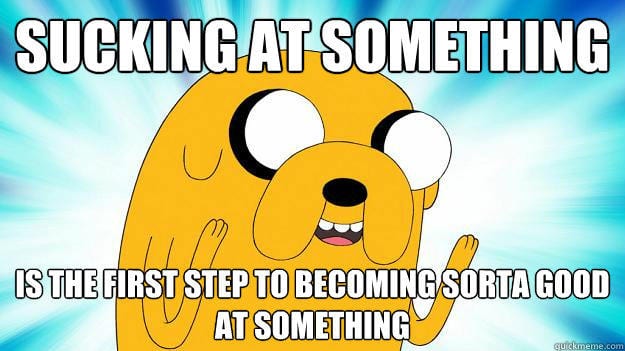
Happy Marketing!


